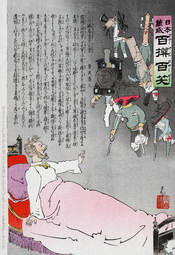In the late 19th century, European powers sought to gain control of east Asia. Because of the superior power of the westerners, East Asia was quickly dominated by European imperialism. As European powers claimed pieces of Asia for themselves, there emerged a Asian power which attempted to mimic the imperialist movement. Japan was the first Asian power to borrow western war technology to expand its sphere of influence. As a result, Japan eventually came into conflict with Russia over the control of Korea, Manchuria, Mongolia, and China. The Russo-Japanese War of 1904-1905 was significant in that it was the first war in which a Asian power emerged victorious over a European power. Thus, Japan forced Russia to abandon its expansionist policy in the Far East. This paper will examine the key components which made Japan victorious over Russia.
Pre-war Japan
In 1853, Commodore Perry of the United States Navy sailed to Japan.
On the shores of Yedo Bay, Perry was met by feudal Japanese war lords. For over two centuries Japan had been closed to all foreigners until American warships forced Japan to open its ports to foreign trade. During this period, emperor Mutsuhito took back his traditional powers from the Tokukugawa shogun, the military leader who had ruled Japan for 250 years. The emperor moved the capital from ancient Kyoto to Edo, now modern Tokyo, and gave himself the name Meiji, meaning 'enlightened ruler'. During the Meiji period (1868-1912), western ideas and business contracts gained great acceptance from the Japanese Populist. The industrialization of Japan was a direct result of western imperialism. In the last fifty years of the 19th century, the modernization of Japan led to its influence on East Asia. Japan could not have emerged as a Asian power if not for the help of the French...


